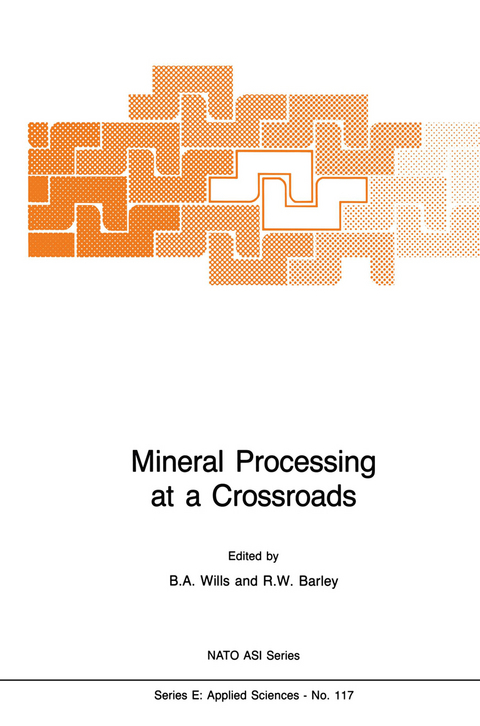
Mineral Processing at a Crossroads
Problems and Prospects
Seiten
1986
Kluwer Academic Publishers (Verlag)
978-90-247-3410-8 (ISBN)
Kluwer Academic Publishers (Verlag)
978-90-247-3410-8 (ISBN)
Proceedings of the NATO Advanced Study Institute, Falmouth, Cornwall, UK, March 24-April 4, 1986
Due to the increasingly complex mineralogy, and lower grade of many current ore reserves, technology has, over the past decade, had to evolve rapidly to treat these materials economically in an industry which has undergone severe periods of recession. However, most of the technical innovations, such as the increasing use of solvent-extraction, ion-exchange etc., have been in the field of chemical ore processing, and, apart from the use of computers and ever larger unit process machines, there have been few major evolutionary changes in the field of physical mineral processing, where conventional crushing and grinding methods, essentially unchanged in half a century, are followed by the 'old-faithfuls'- flotation, gravity, magnetic and electrostatic methods of separation. Many of these techniques have major limitations in the treatment of 'new' ores such as complex sulphides, and the main purpose of the NATO Advanced study Institute (ASI) "Mineral Processing at a Crossroads" was to review the future of mineral processing. One of the great failings of physical methods is their inability to treat ultra-fine particles, and much research effort is required in this area. Flotation is still the most widely used and researched method for separating minerals, and is the only method which can be used to produce separate concentrates from complex sulphide ores. However, its performance on these 'modern' ores is poor, and it is in this area particularly that chemical methods will increasingly be integrated into plant circuits.
Due to the increasingly complex mineralogy, and lower grade of many current ore reserves, technology has, over the past decade, had to evolve rapidly to treat these materials economically in an industry which has undergone severe periods of recession. However, most of the technical innovations, such as the increasing use of solvent-extraction, ion-exchange etc., have been in the field of chemical ore processing, and, apart from the use of computers and ever larger unit process machines, there have been few major evolutionary changes in the field of physical mineral processing, where conventional crushing and grinding methods, essentially unchanged in half a century, are followed by the 'old-faithfuls'- flotation, gravity, magnetic and electrostatic methods of separation. Many of these techniques have major limitations in the treatment of 'new' ores such as complex sulphides, and the main purpose of the NATO Advanced study Institute (ASI) "Mineral Processing at a Crossroads" was to review the future of mineral processing. One of the great failings of physical methods is their inability to treat ultra-fine particles, and much research effort is required in this area. Flotation is still the most widely used and researched method for separating minerals, and is the only method which can be used to produce separate concentrates from complex sulphide ores. However, its performance on these 'modern' ores is poor, and it is in this area particularly that chemical methods will increasingly be integrated into plant circuits.
An overview of the ultrafine problem.- Dissolved-air and electrolytic flotation.- Fine coal cleaning — achievements and possibilities.- Simulation — the design tool for the future.- Emerging automatic control approaches in mineral processing.- Energy usage in mineral processing.- Complex sulphide ores: processing options.- Tin mineralisation in Southwest England.- The development of methods of treating tin ores in Cornwall.- Magnetic separation.- Gravity concentration in modern mineral processing.- Developments in solid-liquid separation.- Strategic minerals — their impact on mineral processing developments.- Appendix List of those attending the NATO Advanced Study Institute at Falmouth, UK 24 March–4 April 1986.
| Reihe/Serie | NATO Science Series E ; 117 |
|---|---|
| Zusatzinfo | VII, 427 p. |
| Verlagsort | Dordrecht |
| Sprache | englisch |
| Maße | 155 x 235 mm |
| Themenwelt | Technik ► Maschinenbau |
| ISBN-10 | 90-247-3410-X / 902473410X |
| ISBN-13 | 978-90-247-3410-8 / 9789024734108 |
| Zustand | Neuware |
| Haben Sie eine Frage zum Produkt? |
Mehr entdecken
aus dem Bereich
aus dem Bereich
Buch | Softcover (2023)
Springer Vieweg (Verlag)
CHF 34,95
Normung, Berechnung, Gestaltung
Buch | Softcover (2023)
Springer Vieweg (Verlag)
CHF 55,95
Buch | Softcover (2023)
Springer Vieweg (Verlag)
CHF 34,95


